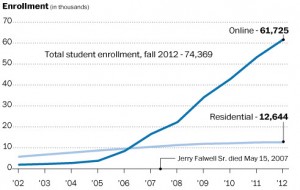 Liberty University was founded in 1971 by Jerry Falwell. While the school was well known and grew considerably under his direction, significant growth has occurred in the nearly six years since his death. Over that period of time, the school has doubled its enrollment not once but twice. Nick Anderson’s recent Washington Post article explores this reality in-depth while also placing the school’s current size in context. Notably:
Liberty University was founded in 1971 by Jerry Falwell. While the school was well known and grew considerably under his direction, significant growth has occurred in the nearly six years since his death. Over that period of time, the school has doubled its enrollment not once but twice. Nick Anderson’s recent Washington Post article explores this reality in-depth while also placing the school’s current size in context. Notably:
- Current enrollment of 74,000 (including 62,000 online students) making Liberty the nation’s largest university with a religious affiliation
- Graduation rates for first-time, full-time students graduate within six years are 11% below the national average
- In academic stature, Liberty trails many schools with religious ties
- Focuses on reaching adults who want online higher education with an evangelical Christian point of view
- Has more than $1 billion in net assets
So What?
While great attention has been given to large for profit universities that primarily attract adult learners (including the nation’s largest university: The University of Phoenix, the tremendous growth of the non-profit Liberty University (with online programs clearly focused at adult learners rather than the younger traditional college student) has largely gone unnoticed. Interestingly while the largest of the for profits have experienced consecutive years of considerable declines in enrollment, Liberty has continued to grow. As the nation’s largest university with a religious affiliation, Liberty has rightfully been called a mega-university.
- Were you aware that Liberty had grown so significantly in recent years? Based on your current knowledge, how would you describe the type and quality of education the school provides?
- What, if any, concerns do you have about Liberty specifically or the concept of a primarily online Christian mega-university more generally?
- How have the universities affiliated with your denomination or religious tradition benefited from or declined as a result of embracing online education? targeting adult learners (those at least 25 years of age)?